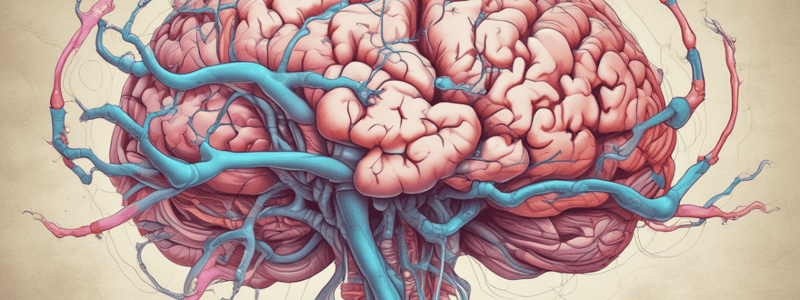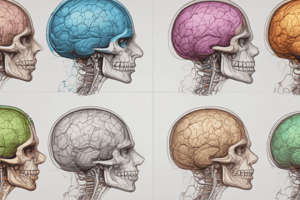Podcast
Questions and Answers
What is the primary site of resorption of CSF in the subarachnoid space?
What is the primary site of resorption of CSF in the subarachnoid space?
- Venous circulation (correct)
- Arachnoid membrane
- Cerebral aqueduct
- Choroid plexus
How many choroid plexuses are present in the brain?
How many choroid plexuses are present in the brain?
- Four (correct)
- Two
- Three
- One
What is the primary function of the brain-CSF boundary?
What is the primary function of the brain-CSF boundary?
- To modulate the entry of leukocytes into the central nervous system
- To facilitate the transport of substances into the brain
- To prevent the passage of blood-borne substances into the brain (correct)
- To remove brain metabolites and metabolic waste into the blood
What forms the blood-CSF boundary at the choroid plexus?
What forms the blood-CSF boundary at the choroid plexus?
What is a distinct feature of the choroid plexus capillaries?
What is a distinct feature of the choroid plexus capillaries?
What is NOT a function of the Blood-Cerebrospinal Fluid Barrier (BCSFB)?
What is NOT a function of the Blood-Cerebrospinal Fluid Barrier (BCSFB)?
What should NOT be confused with the Blood-Cerebrospinal Fluid Barrier (BCSFB)?
What should NOT be confused with the Blood-Cerebrospinal Fluid Barrier (BCSFB)?
What is the primary function of the fenestrated capillaries found in the choroid plexus?
What is the primary function of the fenestrated capillaries found in the choroid plexus?
What is the name of the layer of grey matter in the cerebellum that contains Purkinje cells?
What is the name of the layer of grey matter in the cerebellum that contains Purkinje cells?
Where are discontinuous (sinusoidal) capillaries typically found?
Where are discontinuous (sinusoidal) capillaries typically found?
What is the purpose of the blood-CSF barrier (BCSFB)?
What is the purpose of the blood-CSF barrier (BCSFB)?
Where is the blood-CSF barrier (BCSFB) primarily located?
Where is the blood-CSF barrier (BCSFB) primarily located?
What is the main difference between the blood-CSF barrier (BCSFB) and the blood-brain barrier (BBB)?
What is the main difference between the blood-CSF barrier (BCSFB) and the blood-brain barrier (BBB)?
What is the primary function of the choroid plexus?
What is the primary function of the choroid plexus?
How often is the total volume of CSF formed and renewed?
How often is the total volume of CSF formed and renewed?
What is the main difference between the blood-CSF barrier and the blood-brain barrier?
What is the main difference between the blood-CSF barrier and the blood-brain barrier?
What is the function of microvilli on the epithelial cells of the choroid plexus?
What is the function of microvilli on the epithelial cells of the choroid plexus?
What is the role of the choroid plexus in maintaining the brain's extracellular environment?
What is the role of the choroid plexus in maintaining the brain's extracellular environment?
What is the structure of the choroid plexus that increases its surface area?
What is the structure of the choroid plexus that increases its surface area?
What is the purpose of the choroid plexus in the context of clinical examination?
What is the purpose of the choroid plexus in the context of clinical examination?
What is the name of the layer that populates the internal granular cell layer during early postnatal development?
What is the name of the layer that populates the internal granular cell layer during early postnatal development?
What is the function of the neurons in the ventral horns of the spinal cord?
What is the function of the neurons in the ventral horns of the spinal cord?
What is the shape of the gray matter in a cross-section of the spinal cord?
What is the shape of the gray matter in a cross-section of the spinal cord?
What is the name of the cells that line the central canal of the spinal cord?
What is the name of the cells that line the central canal of the spinal cord?
What is the location of the dorsal horns in the spinal cord?
What is the location of the dorsal horns in the spinal cord?
What is the function of the neurons in the dorsal horns of the spinal cord?
What is the function of the neurons in the dorsal horns of the spinal cord?
What is the name of the layer that is peripheral in the spinal cord?
What is the name of the layer that is peripheral in the spinal cord?
What is the shape of the gray matter in the spinal cord?
What is the shape of the gray matter in the spinal cord?
What is the function of the neurons in the gray matter of the spinal cord?
What is the function of the neurons in the gray matter of the spinal cord?
Study Notes
CSF Circulation
- CSF in the subarachnoid space is resorbed back into the venous circulation.
- The choroid plexus is responsible for CSF production, with four choroid plexuses located in each of the ventricles, except in the cerebral aqueduct, frontal horn, and occipital horn of the lateral ventricles.
Blood-Cerebrospinal Fluid Barrier (BCSFB)
- The BCSFB is composed of a pair of membranes that separate blood from CSF and CSF from brain tissue.
- The blood-CSF boundary at the choroid plexus is a membrane comprising ependymal cells and tight junctions.
- The brain-CSF boundary is the arachnoid membrane, which envelops the surface of the brain.
- Functions of the BCSFB include:
- Preventing the passage of most blood-borne substances into the brain.
- Facilitating the transport of different substances into the brain due to distinct structural characteristics.
- Facilitating the removal of brain metabolites and metabolic waste into the blood.
- Modulating the entry of leukocytes from the blood into the central nervous system.
Classification of Capillaries
- Continuous capillaries: Most common, found in muscle, brain, bone, lung, etc. (e.g., blood-brain and blood-testis barriers).
- Fenestrated capillaries (gaps 10-100 nm): In tissues with substantial fluid exchange (e.g., intestinal villi, choroid plexus, ciliary process, glomerular capillaries).
- Discontinuous (Sinusoidal) capillaries: Found in hepatic and splenic sinusoids, allowing large molecules to exit (e.g., RBC in the spleen).
Cerebellum Anatomy
- Gray matter: Cortex cerebelli, consisting of:
- Molecular layer (basket cells)
- Ganglionic cell layer (Purkinje cells)
- Granular cell layer (granule cells)
- White matter core: Myelinated nerve fibers.
Jan Evangelista Purkyně
- A Czech anatomist and physiologist who:
- Coined the term 'protoplasm' for the fluid substance of a cell (1839).
- Discovered Purkinje cells (1837) and Purkinje fibers (1839).
Cerebrospinal Fluid (CSF)
- Produced by the choroid plexus through filtration of plasma from the blood and active secretion of Na+ into the ventricles, with water following the resulting osmotic gradient.
- Total volume of CSF is formed and renewed three times a day.
- Roles:
- Medium for filtration system, facilitating removal of metabolic waste from the brain.
- Helps maintain delicate extracellular environment required by the brain to function optimally (homeostasis).
- Cushions the CNS in case of impacts.
Choroid Plexus
- A layer of cuboidal epithelial cells surrounding a core of capillaries and loose connective tissue.
- Epithelium consists of modified ependymal cells with microvilli and tight junctions, acting as a blood-CSF barrier.
- The choroid plexus folds into many villi around each capillary, creating frond-like processes that project into the ventricles, increasing the surface area for CSF production.
Spinal Cord
- In cross-section, white matter is peripheral, and gray matter is central, assuming the shape of an H.
- The central canal, a remnant of the embryonic neural tube, is lined with ependymal cells.
- Gray matter forms the ventral horns (anterior horns), containing motor neurons, and dorsal horns (posterior horns), receiving sensory fibers from spinal ganglia.
Nucleus in CNS
- A cluster of neurons in the CNS, located deep within the cerebral hemispheres and brainstem, performing a common function.
Studying That Suits You
Use AI to generate personalized quizzes and flashcards to suit your learning preferences.
Related Documents
Description
Learn about the circulation of cerebrospinal fluid, its resorption into venous circulation, and the role of choroid plexus in the ventricular system.




